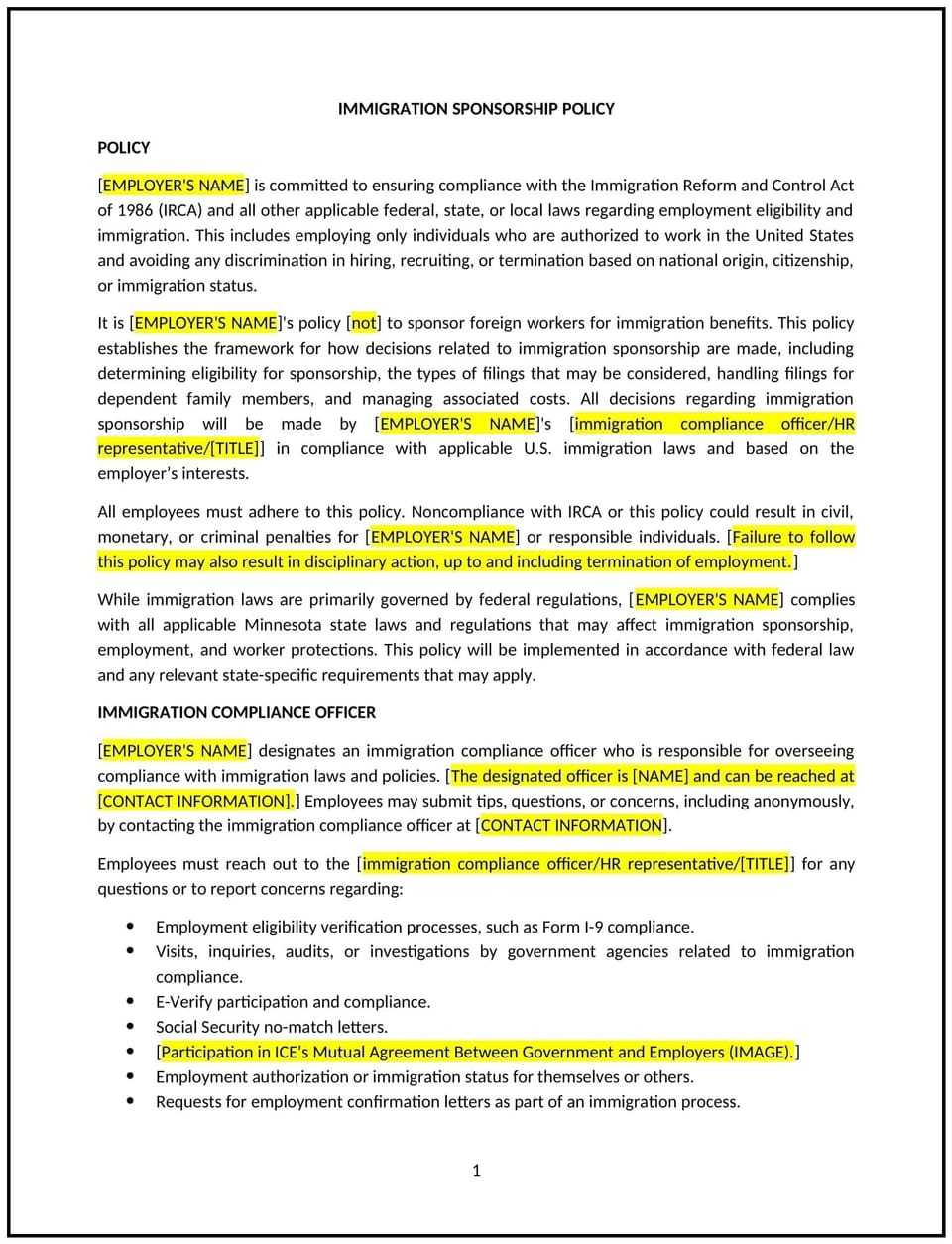Immigration sponsorship policy (Minnesota): Free template

Immigration sponsorship policy (Minnesota)
This immigration sponsorship policy is designed to help Minnesota businesses understand and manage the process of sponsoring foreign workers for visas or work permits. It outlines the company’s approach to hiring foreign employees, the steps involved in sponsorship, and the responsibilities of both the employer and employee throughout the sponsorship process.
By implementing this policy, businesses can streamline the sponsorship process, attract global talent, and ensure that the company adheres to all relevant federal and state immigration regulations.
How to use this immigration sponsorship policy (Minnesota)
- Define sponsorship criteria: Clearly outline the types of positions for which the company will sponsor foreign workers and the qualifications required for eligibility, such as specialized skills, education, or experience.
- Identify eligible visa categories: Specify which visa categories (e.g., H-1B, L-1, TN, O-1) the company is willing to sponsor and the qualifications for each type.
- Set the application process: Describe the steps for applying for immigration sponsorship, including when the company will initiate the process, any required documentation, and how the process will be handled (e.g., internally or through external immigration counsel).
- Establish employee responsibilities: Explain the responsibilities of employees seeking sponsorship, such as providing necessary documents, complying with legal requirements, and maintaining valid visa status.
- Outline costs and financial responsibilities: Specify who will bear the costs associated with immigration sponsorship, including application fees, legal fees, and any other related expenses.
- Address job security during the sponsorship process: Outline the company’s policy on job security for employees who are undergoing immigration sponsorship, ensuring that employees are not penalized or terminated because of their visa status.
Benefits of using an immigration sponsorship policy (Minnesota)
Implementing this policy provides several advantages for Minnesota businesses:
- Expands talent pool: Sponsoring foreign workers allows businesses to tap into a broader, more diverse talent pool, helping them recruit employees with specialized skills that may be in short supply locally.
- Strengthens workforce diversity: By hiring individuals from different cultural and geographical backgrounds, businesses can enhance their workforce diversity, which can lead to better innovation and problem-solving.
- Reduces turnover: Offering immigration sponsorship can help businesses retain highly skilled foreign employees by providing stability and job security, improving employee loyalty and reducing turnover.
- Demonstrates global inclusivity: A commitment to sponsoring foreign workers sends a message that the company values international talent and diversity, which can enhance its reputation globally and locally.
- Reflects Minnesota-specific considerations: Tailors the policy to align with Minnesota’s labor market trends, the state’s demand for specific skilled workers, and any state-specific immigration laws or considerations.
Tips for using this immigration sponsorship policy (Minnesota)
- Communicate clearly: Ensure that all employees understand the immigration sponsorship process, eligibility requirements, and how to apply for sponsorship if needed.
- Stay informed about immigration law: Keep updated on federal and state immigration regulations to ensure that the sponsorship process complies with current laws and policies.
- Offer guidance to employees: Provide support to foreign employees by guiding them through the immigration process and connecting them with legal or immigration professionals if necessary.
- Plan ahead: Start the sponsorship process early to account for potential delays in visa approval or processing, and keep employees informed about the timeline.
- Monitor the process: Regularly check the status of employee sponsorships, ensuring that all documents are filed correctly and on time, and that employees’ visas are maintained properly throughout their employment.
Q: Who is eligible for immigration sponsorship?
A: Businesses should specify which positions are eligible for immigration sponsorship, such as roles requiring specialized skills or knowledge, and which visa categories apply to those roles (e.g., H-1B for specialized workers).
Q: What visa categories does the company sponsor?
A: The business should outline which visa categories it is willing to sponsor, such as H-1B, L-1, O-1, or TN, depending on the needs of the company and the employee’s qualifications.
Q: What is the process for requesting sponsorship?
A: Employees seeking sponsorship should follow the company’s application process, which may include submitting required documentation, completing forms, and following up with HR or legal representatives for guidance throughout the process.
Q: Who bears the cost of immigration sponsorship?
A: Businesses should specify who will pay for the various costs involved in the immigration process, including visa application fees, legal fees, and any other related costs. Typically, the company covers most costs, but this can vary depending on the company’s policies.
Q: Will my job be secure during the immigration sponsorship process?
A: Businesses should assure employees that their job security will not be affected by their immigration status or the sponsorship process. Employees should continue to perform their job duties and be treated the same as other employees during the process.
Q: How long does the sponsorship process take?
A: The length of the sponsorship process depends on the type of visa and processing times. Businesses should communicate any known timelines for the application process, including when to expect decisions and any potential delays.
Q: Can employees work while their immigration application is pending?
A: Businesses should clarify whether employees can continue working during the waiting period for their visa application, typically in accordance with the terms of their current visa or work authorization.
Q: How often should this policy be reviewed?
A: The policy should be reviewed annually or whenever there are significant changes to immigration law or the company’s needs regarding foreign talent. It should also be updated as new visa categories or sponsorship opportunities become available.
This article contains general legal information and does not contain legal advice. Cobrief is not a law firm or a substitute for an attorney or law firm. The law is complex and changes often. For legal advice, please ask a lawyer.


